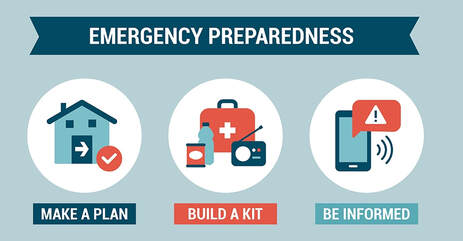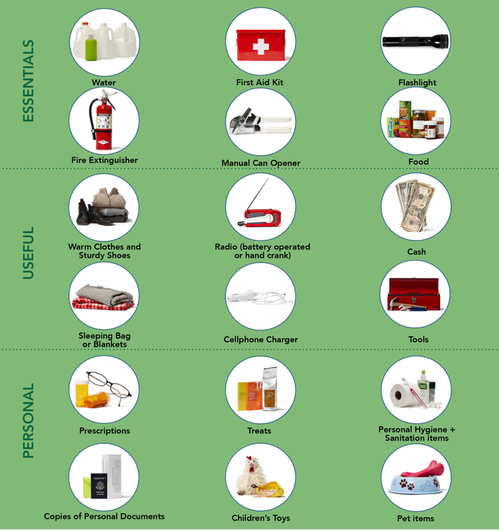Hancock County Health Department staff receive training to help become better prepared for a natural or manmade disaster. In addition, the HCHD provides information to the public regarding health and safety issues that focus on preparedness, for example, winter weather safety, summer safety, how to make an emergency kit, and planning for a disaster situation with your family.
What Is The Meaning of Emergency Preparedness:
The term refers to the steps you take to make sure you are safe before, during and after an emergency or natural disaster. These plans are important for your safety in both natural disaster and man-made disaster.
Severe Weather Preparedness: (Severe Weather Preparedness Guide (pdf))
Sever weather can happen at any time of year. Preparing for floods, tornadoes and severe thunderstorms before they strike will help you stay safe throughout the year. To help people better prepare for weather emergencies, the Illinois Emergency Management Agency and National Weather Service developed this Severe Weather Preparedness Guide to help educate and better prepare Illinois residents for all hazards.
Every year in the United States, hundreds of people are killed and thousands injured because of the weather. Dangerous weather can take many forms, ranging from violent tornadoes to crippling winter storms. While there is nothing, we can do to stop dangerous weather from affecting us, there are things we can do to stay safe when the sky turns grey.
Weather safety and survival- no matter the hazards – depends on the following key items:
Know the Hazards- Be aware of the hazards that exist where you live.
Know When to Expect Dangerous Weather- Monitor forecasts and information from your local National Weather Service, and always have more that one way to receive emergency alerts and notification.
Be Alert and Ready- Be aware of issued watches, warnings and advisories. Know what protective actions to take during each level of notifications,
Have a Plan to Stay Safe- Make sure that each member of your family knows what protective actions to make during each level of notifications.
Use the tips provided to prepare yourself and your family before severe storms impact Illinois again.
10 Items to Include in Your Emergency Kit:
(https://www.fema.gov/blog/10-items-include-your-emergency-kit)
The term refers to the steps you take to make sure you are safe before, during and after an emergency or natural disaster. These plans are important for your safety in both natural disaster and man-made disaster.
Severe Weather Preparedness: (Severe Weather Preparedness Guide (pdf))
Sever weather can happen at any time of year. Preparing for floods, tornadoes and severe thunderstorms before they strike will help you stay safe throughout the year. To help people better prepare for weather emergencies, the Illinois Emergency Management Agency and National Weather Service developed this Severe Weather Preparedness Guide to help educate and better prepare Illinois residents for all hazards.
Every year in the United States, hundreds of people are killed and thousands injured because of the weather. Dangerous weather can take many forms, ranging from violent tornadoes to crippling winter storms. While there is nothing, we can do to stop dangerous weather from affecting us, there are things we can do to stay safe when the sky turns grey.
Weather safety and survival- no matter the hazards – depends on the following key items:
Know the Hazards- Be aware of the hazards that exist where you live.
Know When to Expect Dangerous Weather- Monitor forecasts and information from your local National Weather Service, and always have more that one way to receive emergency alerts and notification.
Be Alert and Ready- Be aware of issued watches, warnings and advisories. Know what protective actions to take during each level of notifications,
Have a Plan to Stay Safe- Make sure that each member of your family knows what protective actions to make during each level of notifications.
Use the tips provided to prepare yourself and your family before severe storms impact Illinois again.
10 Items to Include in Your Emergency Kit:
(https://www.fema.gov/blog/10-items-include-your-emergency-kit)
In accordance with federal civil rights law and U.S. Department of Agriculture (USDA) civil rights regulations and policies, this
institution is prohibited from discriminating on the basis of race, color, national origin, sex (including gender identity
and sexual orientation), disability, age, or reprisal or retaliation for prior civil rights activity.
Program information may be made available in languages other than English.
Persons with disabilities who require alternative means of communication to obtain program information (e.g., Braille,
large print, audiotape, American Sign Language), should contact the responsible state or local agency
that administers the program or USDA’s TARGET Center at (202) 720-2600 (voice and TTY)
or contact USDA through the Federal Relay Service at (800) 877-8339.
To file a program discrimination complaint, a Complainant should complete a Form AD3027, USDA Program Discrimination Complaint
Form which can be obtained online at: https://www.usda.gov/sites/default/files/documents/USDA-OASCR%20P-ComplaintForm-0508-0002-508-11-28-17Fax2Mail.pdf, from any USDA office, by calling (866) 632-9992, or by writing a letter addressed to USDA.
The letter must contain the complainant’s name, address, telephone number, and a written description of the alleged
discriminatory action in sufficient detail to inform the Assistant Secretary for Civil Rights (ASCR) about the nature
and date of an alleged civil rights violation. The completed AD-3027 form or letter must be submitted to USDA by: 1. mail: U.S.
Department of Agriculture Office of the Assistant Secretary for Civil Rights 1400 Independence Avenue, SW Washington, D.C.
20250-9410; or 2. fax: (833) 256-1665 or (202) 690-7442; or 3. email: [email protected].
This institution is an equal opportunity provider.
Updated 5/5/2022
In accordance with federal civil rights law and U.S. Department of Agriculture (USDA) civil rights regulations and policies, this
institution is prohibited from discriminating on the basis of race, color, national origin, sex (including gender identity
and sexual orientation), disability, age, or reprisal or retaliation for prior civil rights activity.
Program information may be made available in languages other than English.
Persons with disabilities who require alternative means of communication to obtain program information (e.g., Braille,
large print, audiotape, American Sign Language), should contact the responsible state or local agency
that administers the program or USDA’s TARGET Center at (202) 720-2600 (voice and TTY)
or contact USDA through the Federal Relay Service at (800) 877-8339.
To file a program discrimination complaint, a Complainant should complete a Form AD3027, USDA Program Discrimination Complaint
Form which can be obtained online at: https://www.usda.gov/sites/default/files/documents/USDA-OASCR%20P-ComplaintForm-0508-0002-508-11-28-17Fax2Mail.pdf, from any USDA office, by calling (866) 632-9992, or by writing a letter addressed to USDA.
The letter must contain the complainant’s name, address, telephone number, and a written description of the alleged
discriminatory action in sufficient detail to inform the Assistant Secretary for Civil Rights (ASCR) about the nature
and date of an alleged civil rights violation. The completed AD-3027 form or letter must be submitted to USDA by: 1. mail: U.S.
Department of Agriculture Office of the Assistant Secretary for Civil Rights 1400 Independence Avenue, SW Washington, D.C.
20250-9410; or 2. fax: (833) 256-1665 or (202) 690-7442; or 3. email: [email protected].
This institution is an equal opportunity provider.
Updated 5/5/2022

